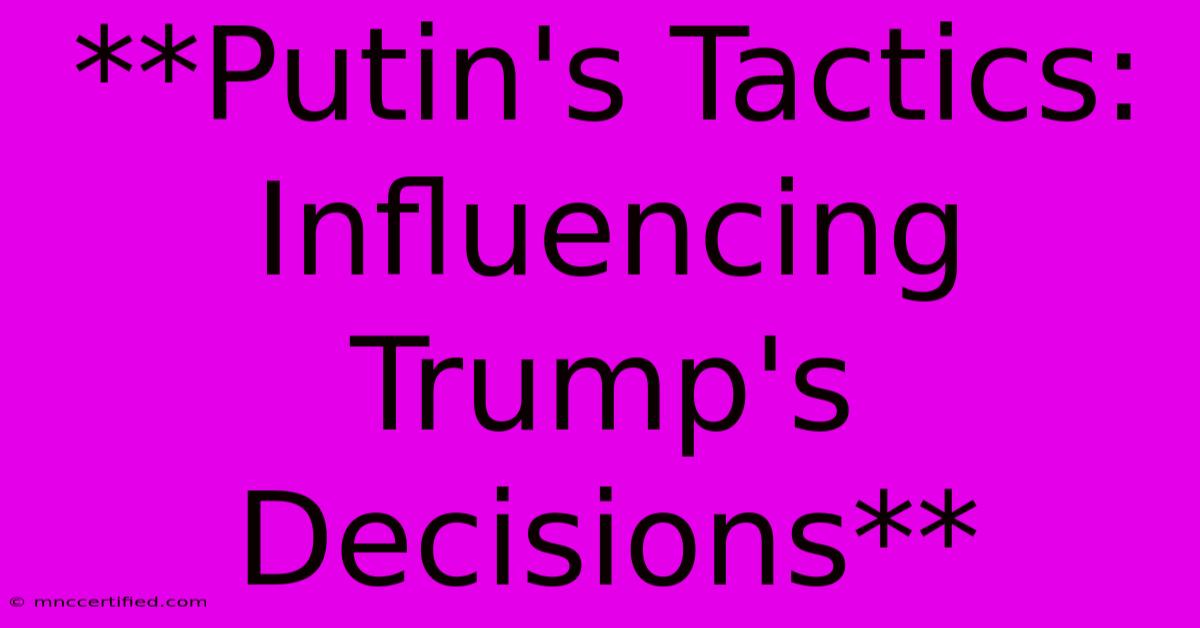**Putin's Tactics: Influencing Trump's Decisions**

Table of Contents
Putin's Tactics: Influencing Trump's Decisions
The relationship between Vladimir Putin and Donald Trump has been a subject of intense scrutiny and speculation throughout Trump's presidency. Accusations of Russian interference in the 2016 election and alleged attempts by Putin to influence Trump's decisions raised concerns about the potential for foreign influence on US policy. While the full extent of their interactions remains unclear, examining the tactics Putin employed and the potential impact on Trump's decisions offers insights into this complex relationship.
Putin's Strategic Approach
Putin has long been recognized for his strategic approach to international relations, often employing a blend of hard and soft power. He prioritizes achieving Russia's national interests through a combination of:
- Information Warfare: Utilizing propaganda, misinformation, and social media manipulation to sow discord and influence public opinion.
- Cyberattacks: Targeting critical infrastructure and electoral systems to disrupt stability and undermine trust.
- Economic Leverage: Employing energy resources and financial instruments to exert pressure on foreign governments.
- Diplomatic Engagement: Engaging in bilateral negotiations and multilateral forums to advance Russian interests.
These tactics, applied in a multifaceted manner, allowed Putin to cultivate leverage and potentially influence decision-making within the Trump administration.
Evidence of Influence
Several instances suggest potential Russian influence on Trump's decisions:
- The 2016 Election Interference: Investigations revealed extensive Russian interference in the 2016 election, including hacking into Democratic National Committee servers and disseminating disinformation through social media. While the exact impact on the election outcome remains debated, the interference raised serious concerns about the vulnerability of US democracy.
- The Helsinki Summit: Trump's decision to accept Putin's denials regarding Russian interference in the election at the 2018 Helsinki Summit drew widespread criticism. The summit highlighted a clear disconnect between Trump's stance and US intelligence assessments, raising questions about his susceptibility to Putin's influence.
- The Syria Withdrawal: Trump's decision to withdraw US troops from Syria in 2019 coincided with Putin's ambitions to expand Russian influence in the region. Critics argued that the withdrawal played into Putin's hands, allowing Russia to gain a strategic advantage.
The Role of Personal Relationships
Beyond policy, personal relationships may have played a significant role in the dynamics between Putin and Trump. Trump's admiration for Putin, expressed on numerous occasions, suggested a potential personal connection that could have impacted his decision-making. Furthermore, the lack of transparency surrounding their interactions fueled speculation about the nature and extent of their communications.
Implications and Future Prospects
The potential for Russian influence on Trump's decisions raises critical questions about the security of US democracy and the integrity of its foreign policy. The implications extend beyond the Trump presidency, as the tactics Putin employed can be replicated and adapted in future efforts to influence other governments.
Moving forward, it is crucial to strengthen democratic institutions, enhance cybersecurity defenses, and address the vulnerabilities that allow foreign actors to influence domestic politics. Examining the tactics employed by Putin and their potential impact on Trump's decisions provides valuable lessons for preventing similar occurrences in the future.
Note: This article provides a neutral overview of the topic and does not endorse any particular political viewpoint. It is important to consider multiple perspectives and conduct further research on this complex issue.

Thank you for visiting our website wich cover about **Putin's Tactics: Influencing Trump's Decisions**. We hope the information provided has been useful to you. Feel free to contact us if you have any questions or need further assistance. See you next time and dont miss to bookmark.
Featured Posts
-
Why Is Vision Not Covered By Insurance
Nov 09, 2024
-
Canadian Direct Insurance Vancouver Bc
Nov 09, 2024
-
Srr Building Material Trading Llc Dubai
Nov 09, 2024
-
Insurance Contract Management Software
Nov 09, 2024
-
Amsterdam Mayor Denounces Hit And Run Attacks On Israeli Football
Nov 09, 2024